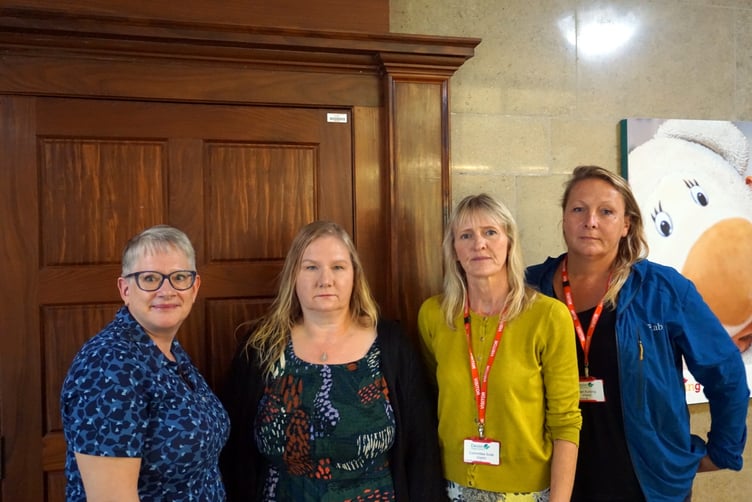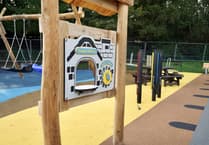PARENTS of children with special educational needs and disabilities (SEND) say that the system is still failing them, despite promises from Devon County Council to create a ‘system-wide change’.
In a meeting of DCC’s Children’s Scrutiny Panel held at County Hall in Exeter last week, five parents came together to voice their concerns over both the treatment of their children and the future of Devon’s SEND provision.
Devon County Council and NHS Devon work in partnership to run SEND services.
Issues of ‘significant concern’ in Devon’s SEND provision were initially identified in 2018, after a joint visit by Ofsted and the Care Quality Commission.
A revisit in 2022 found that the new strategy launched in 2020 ‘fundamentally fails to address the significant weaknesses that were apparent at the previous inspection.’
The scathing report prompted the Department for Education and NHS England to meet with the Council to discuss more drastic measures such as government intervention.
The report continued: ‘The lack of coherent action is significantly affecting the lives of children and young people and their families.’
The report claimed ‘there is a culture of acceptance about the ways things are’ from staff, while parents are ‘very critical of the level of their involvement in consultations’ and ‘do not understand how the plans will improve their families’ lives.’
Parents say that the failings in Devon’s SEND provision continue to be felt. To get their voices heard, they came together to create a group, the Devon SEND Parents and Carers for Change, which now has over 720 families involved. Parents say that failings in the system are leading to children going without adequate education ‘for months or even years.’
One parent, who asked not to be named, told the Scrutiny Committee about their experiences concerning one of their three adopted children. They said: ‘Securing a suitable secondary school placement for my adopted daughter was a horrendous process. Despite clear evidence from professionals about the kind of placement required, an unsuitable mainstream school, who clearly stated they could not meet her needs, was named on her EHCP by the mysterious “panel”.
‘Unwilling to shift the Local Authority on their inappropriate decision, we were forced to appeal our daughter’s school placement. For most children, not knowing where they were going to secondary school would be unsettling. For a child who has experienced early life trauma, the impact is devastating and long-lasting.’
Another parent, Lucy Wilson, explained to the Committee that her son, who uses sign language, was not diagnosed with ADHD until he was 14, seven years after she had initially noticed symptoms.
She said: ‘He had fallen so far behind he had to attend a specialist deaf school out of county. Picked up earlier, the medication would have helped him sooner and at 21 not need to still be in education because he is so far behind.’
She criticised the long tribunal process she was forced to undertake after mistakes were made in her son’s Education, Health and Care Plan (EHCP).
She added: ‘There is a culture, and has been for years, that parents don’t feel listened to. The parent knows their child best and this should be a cohesive procedure.’
The Devon partnership responsible for supporting SEND children and young people said that it has listened to families and expanded its plans. They committed to ‘look at not just areas of weakness identified by Ofsted and Care Quality Commission but at the whole experience.’
Their programme, they said, would address the significant challenges that the local area faces, improve the experiences of children, young people and their families in Devon and lead to the financial sustainability of the council.
Stuart Collins, the new permanent Director of Children and Young People’s Futures at DCC, said: ‘We know, from what parents and young people are telling us and from our data and intelligence, that the current improvement activity alone will not drive the significant change required.
‘We need everyone working together with a clear vision of what good looks like so that children and young people with SEND, and their families, receive the right support at the right time and in the right place so they can thrive.’
However, parents criticise the latest plans as vague and non-collaborative.
Elaine Davis-Kimble lives in Chudleigh. She began pursuing a Ph.D. on the topic after her son was diagnosed with special educational needs. She says that the issues that face her son and thousands of others are not just a problem of policy but of funding and culture as well.
Elaine said: ‘There needs to be a huge cultural shift, right now. There’s a lot of apathy, there’s a lot of us versus them. There’s a cultural acceptance of how it is.’
Like many other parents, Elaine says that effective communication between parents, pupils and providers is crucial in changing the system for the better.
She said: ‘True co-production is sitting down with the user and asking the questions that need to be asked, rather than ticking a box. They need to ask the right questions, that’s fundamental. They won’t turn the ship around without doing that.’
She added: ‘Every child’s need should be met, through appropriate placement and through appropriate provision. That’s what they’re all legally entitled to.’

-Councillor-Brazil-Councillor-Hodgson-Councillor-Leadbetter-Councillor-Fife.png?width=209&height=140&crop=209:145,smart&quality=75)



Comments
This article has no comments yet. Be the first to leave a comment.